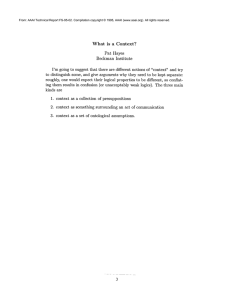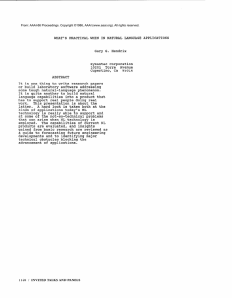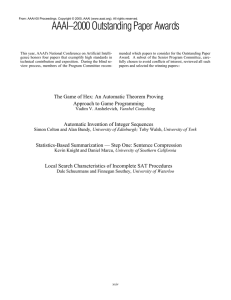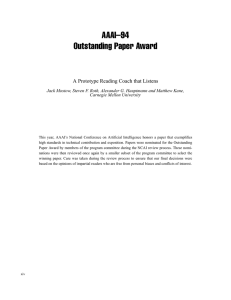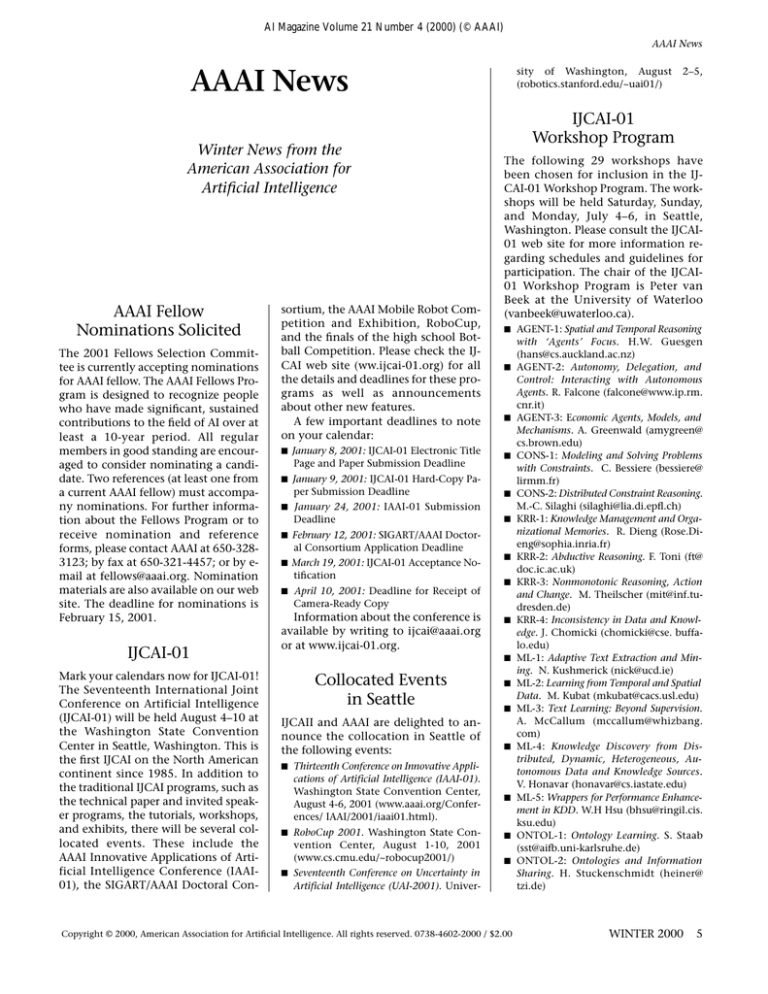
AI Magazine Volume 21 Number 4 (2000) (© AAAI)
AAAI News
sity of Washington, August
(robotics.stanford.edu/~uai01/)
AAAI News
Winter News from the
American Association for
Artificial Intelligence
AAAI Fellow
Nominations Solicited
The 2001 Fellows Selection Committee is currently accepting nominations
for AAAI fellow. The AAAI Fellows Program is designed to recognize people
who have made significant, sustained
contributions to the field of AI over at
least a 10-year period. All regular
members in good standing are encouraged to consider nominating a candidate. Two references (at least one from
a current AAAI fellow) must accompany nominations. For further information about the Fellows Program or to
receive nomination and reference
forms, please contact AAAI at 650-3283123; by fax at 650-321-4457; or by email at fellows@aaai.org. Nomination
materials are also available on our web
site. The deadline for nominations is
February 15, 2001.
IJCAI-01
Mark your calendars now for IJCAI-01!
The Seventeenth International Joint
Conference on Artificial Intelligence
(IJCAI-01) will be held August 4–10 at
the Washington State Convention
Center in Seattle, Washington. This is
the first IJCAI on the North American
continent since 1985. In addition to
the traditional IJCAI programs, such as
the technical paper and invited speaker programs, the tutorials, workshops,
and exhibits, there will be several collocated events. These include the
AAAI Innovative Applications of Artificial Intelligence Conference (IAAI01), the SIGART/AAAI Doctoral Con-
sortium, the AAAI Mobile Robot Competition and Exhibition, RoboCup,
and the finals of the high school Botball Competition. Please check the IJCAI web site (ww.ijcai-01.org) for all
the details and deadlines for these programs as well as announcements
about other new features.
A few important deadlines to note
on your calendar:
■ January 8, 2001: IJCAI-01 Electronic Title
Page and Paper Submission Deadline
IJCAI-01
Workshop Program
The following 29 workshops have
been chosen for inclusion in the IJCAI-01 Workshop Program. The workshops will be held Saturday, Sunday,
and Monday, July 4–6, in Seattle,
Washington. Please consult the IJCAI01 web site for more information regarding schedules and guidelines for
participation. The chair of the IJCAI01 Workshop Program is Peter van
Beek at the University of Waterloo
(vanbeek@uwaterloo.ca).
■ AGENT-1: Spatial and Temporal Reasoning
■
■
■
■ January 9, 2001: IJCAI-01 Hard-Copy Pa-
per Submission Deadline
■
■ January 24, 2001: IAAI-01 Submission
Deadline
■
■ February 12, 2001: SIGART/AAAI Doctor-
al Consortium Application Deadline
■ March 19, 2001: IJCAI-01 Acceptance No-
tification
■ April 10, 2001: Deadline for Receipt of
■
■
Camera-Ready Copy
Information about the conference is
available by writing to ijcai@aaai.org
or at www.ijcai-01.org.
■
■
Collocated Events
in Seattle
IJCAII and AAAI are delighted to announce the collocation in Seattle of
the following events:
■
■
■
■ Thirteenth Conference on Innovative Appli-
cations of Artificial Intelligence (IAAI-01).
Washington State Convention Center,
August 4-6, 2001 (www.aaai.org/Conferences/ IAAI/2001/iaai01.html).
■
■ RoboCup 2001. Washington State Con-
■
vention Center, August 1-10, 2001
(www.cs.cmu.edu/~robocup2001/)
2–5,
■
■ Seventeenth Conference on Uncertainty in
Artificial Intelligence (UAI-2001). Univer-
Copyright © 2000, American Association for Artificial Intelligence. All rights reserved. 0738-4602-2000 / $2.00
with ‘Agents’ Focus. H.W. Guesgen
(hans@cs.auckland.ac.nz)
AGENT-2: Autonomy, Delegation, and
Control: Interacting with Autonomous
Agents. R. Falcone (falcone@www.ip.rm.
cnr.it)
AGENT-3: Economic Agents, Models, and
Mechanisms. A. Greenwald (amygreen@
cs.brown.edu)
CONS-1: Modeling and Solving Problems
with Constraints. C. Bessiere (bessiere@
lirmm.fr)
CONS-2: Distributed Constraint Reasoning.
M.-C. Silaghi (silaghi@lia.di.epfl.ch)
KRR-1: Knowledge Management and Organizational Memories. R. Dieng (Rose.Dieng@sophia.inria.fr)
KRR-2: Abductive Reasoning. F. Toni (ft@
doc.ic.ac.uk)
KRR-3: Nonmonotonic Reasoning, Action
and Change. M. Theilscher (mit@inf.tudresden.de)
KRR-4: Inconsistency in Data and Knowledge. J. Chomicki (chomicki@cse. buffalo.edu)
ML-1: Adaptive Text Extraction and Mining. N. Kushmerick (nick@ucd.ie)
ML-2: Learning from Temporal and Spatial
Data. M. Kubat (mkubat@cacs.usl.edu)
ML-3: Text Learning: Beyond Supervision.
A. McCallum (mccallum@whizbang.
com)
ML-4: Knowledge Discovery from Distributed, Dynamic, Heterogeneous, Autonomous Data and Knowledge Sources.
V. Honavar (honavar@cs.iastate.edu)
ML-5: Wrappers for Performance Enhancement in KDD. W.H Hsu (bhsu@ringil.cis.
ksu.edu)
ONTOL-1: Ontology Learning. S. Staab
(sst@aifb.uni-karlsruhe.de)
ONTOL-2: Ontologies and Information
Sharing. H. Stuckenschmidt (heiner@
tzi.de)
WINTER 2000
5
AAAI News
■ ONTOL-3: IEEE Standard Upper Ontology.
■
■
■
■
■
■
■
■
■
■
■
■
A. Pease (apease@teknowledge.com)
OTTO-1: Stochastic Search. H. Hoos
(hoos@cs.ubc.ca)
OTTO-2: Empirical Methods in AI. T.
Stuetzle (tom@intellektik.informatik.tudarmstadt.de)
OTTO-3: Effective Interactive AI Resources.
R. Greiner (greiner@cs.ualberta.ca)
PRO-1: Reasoning with Uncertainty in
Robotics. D. Fox, A. Saffiotti (fox@cs.
washington.edu)
PRO-2: Planning under Uncertainty and Incomplete Information. J. Rintanen (rintanen@informatik.uni-freiburg.de)
PRO-3: Planning with Resources. A.
Nareyek (alex@ai-center.com)
TASK-1: AI in Mobile Systems. R. Malaka
(Rainer.Malaka@EML.Villa-Bosch.de)
TASK-2: Configuration. T. Soininen
(Timo.Soininen@hut.fi)
TASK-3: AI and Manufacturing. D. Gaines
(daniel.m.gaines@vanderbilt.edu)
TASK-4: Knowledge and Reasoning in Practical Dialogue Systems. K. Jokinen (kristiina.jokinen@sail.com)
WEB-1: E-Business and the Intelligent Web.
A. Preece (apreece@csd.abdn.ac.uk)
WEB-2: Intelligent Techniques for Web
Personalization. S. S. Anand (sarab@
mineit.com)
IJCAI-01 Student Programs
AAAI and IJCAII are pleased to announce the continuation of their
Scholarship and Volunteer Programs
for students interested in attending
the International Joint Conference on
Artificial Intelligence in Seattle, Washington, USA, August 4–10, 2001. The
U.S. Scholarship Program provides
partial travel support and a complimentary technical program registration for students who are full-time undergraduate or graduate students at
U.S. colleges and universities; are
members of AAAI; submit papers to
the technical program or letters of recommendation from their faculty adviser; and submit scholarship applications to AAAI by April 15, 2001. In
addition, repeat scholarship applicants must have fulfilled the volunteer
and reporting requirements for previous awards.
In the event that scholarship applications exceed available funds, preference will be given to students who
have an accepted technical paper and
then to students who are actively participating in the conference in some
6
AI MAGAZINE
way. However, all eligible students are
encouraged to apply.
After the conference, an expense report will be required to account for the
funds awarded. For further information about the U.S. Scholarship Program or to obtain an application,
please contact AAAI at scholarships
@aaai.org, or 445 Burgess Drive, Menlo
Park, CA 94025, USA; 650-328-3123
phone; 650-321-4457 fax.
Separate travel award programs are
available for international students
through IJCAII and other national societies. In addition, IJCAII will continue its travel support program for junior scientists from developing
countries who have problems with
currency conversion. For information
regarding any of these international
programs, please write to Priscilla Rasmussen at rasmussen@cs.rutgers.edu
or IJCAII at 75 Paterson Street, Suite 9,
New Brunswick, NJ 08901, USA, 732342-9100 phone, 732-342-9339 fax.
International students and junior
scientists should first contact their local societies to see if support is available. If no other support is available,
they can apply to IJCAII for support by
submitting three copies of a letter of
application that includes (1) applicant
name/address/e-mail, (2) status of applicant (undergraduate, graduate student, junior faculty, and so on), (3)
type of planned participation at IJCAI01 (technical or workshop paper presentation, and so on), (4) an estimate
of attendance costs, (5) whether other
societies have been approached for
support and result and any other
sources of possible support, and (6) a
letter of support from the adviser (student applicants only). A postconference report and receipts will be required to obtain the award after the
close of the conference. The deadline
for submission of applications is April
15, 2001, to Priscilla Rasmussen at the
previous address. Should applications
exceed available funding, priority will
be given to (1) students presenting
technical session papers, (2) junior scientists from developing countries presenting technical papers, (3) students
presenting workshop papers, and (4)
junior scientists from developing
countries participating in the conference in other ways.
All student scholarship recipients
will be required to participate in the
Student Volunteer Program to support
IJCAI organizers in Seattle. The Volunteer Program is an essential part of the
conference, and student participation
is a valuable contribution.
Students not requiring travel assistance should only apply for the Volunteer Program, which provides complimentary registration to full-time
students, including conference proceedings, in exchange for assisting IJCAI-01 organizers in Seattle. This program does not provide any scholarship
funds and is designed for local students
or students who have other sources for
travel funds. For further information
regarding the Student Volunteer Program, please contact AAAI at volunteer@aaai.org. The deadline for volunteer applications is May 31, 2001.
2001 Spring
Symposium Series
The 2001 Spring Symposium Series
will be held March 26–28, 2001, at
Stanford University and will feature
seven symposia:
■ Answer Set Programming: Toward Effi-
cient and Scalable Knowledge Representation and Reasoning
■ Artificial Intelligence and Interactive En-
tertainment
■ Game-Theoretic and Decision-Theoretic
Agents
■ Learning Grounded Representations
■ Model-Based Validation of Intelligence
■ Robotics and Education
■ Robust Autonomy
Registration materials have been
mailed to all AAAI members and invited participants. They are also
available on the AAAI web site. Please
note that the deadline for registration for invited participants is February 9, and the general registration
deadline is February 26.
2001 Fall
Symposium Series
The following five symposia have been
selected for the 2000 Fall Symposium
Series, which will be held at the Sea
Crest Conference Center in North Falmouth, Massachusetts:
AAAI News
■ Anchoring Symbols to Sensor Data in Sin-
gle and Multiple Robot Systems. Cochairs:
Silvia Coradeschi (silvia. coradeschi@
tech.oru.se) and Alessandro Saffiotti
(alessandro.saffiotti@tech.oru.se)
■ Emotional and Intelligent II: The Tan-
gled Knot of Social Cognition. Chair: Lola Canamero (lola@lri.fr)
■ Intent Inference for Collaborative Tasks.
Chair: Benjamin Bell (benjamin.l.bell@
lmco.com)
■ Negotiation Methods for Autonomous
Cooperative Systems. Chair: Costas Tsatsoulis (tsatsoul@ittc.ukans.edu)
■ Using Uncertainity within Computation.
Cochairs: Carla Gomes (gomes@cs.cornell.edu) and Toby Walsh (tw@cs.york.
ac.uk)
The deadline for submissions is
March 30, 2001. The Call for Participation has been sent to all AAAI members and posted on the AAAI web site.
Minutes, AAAI Executive
Council Meeting
Austin Texas, July 30, 2000.
Attending: Bruce Buchanan, Jan Aikins,
Tim Finin, Ken Ford, Barbara Grosz,
Jim Hendler, Haym Hirsh, Henry
Kautz, David Leake, Tom Mitchell,
Norm Nielsen, Paul Rosenbloom, Stuart Russell, Reid Simmons, Manuela
Veloso, David Waltz, Michael Wellman, Carol Hamilton, Mike Hamilton
AAAI President Bruce Buchanan
opened the meeting at 9:05 AM. He
thanked retiring councilors Jan Aikins,
Bonnie Dorr, Eric Horvitz, and Stuart
Russell for their three years of service
on the Council. He then announced
the four newly elected Councilors—Rina Dechter, Craig Boutilier, Richard
Doyle, and David Poole—who began
their terms of office after the Annual
Meeting on August 2.
Standing Committee Reports
Conference. Paul Rosenbloom, the
AAAI Conference Committee Chair, reported that attendance at the national
conference was slightly up from 1999
when AAAI competed with IJCAI.
However, it did not meet the level of
1998 when there were several collocated conferences. Tutorial participation
continued to grow—up 33 percent
from 1999 and double the participation in 1998. This is because there is no
longer a separate charge for the tutorials. Workshop participation remained
fairly constant. A large influx of high
school students was expected to participate in the finals of the national Botball championships. Participants almost doubled this year. Paul then
turned the report over to Henry Kautz,
AAAI-2000 program cochair; Rina
Dechter, AAAI-02 cochair; and Haym
Hirsh, program cochair for IAAI-2000.
Henry Kautz reported that the conference structure remained approximately the same as that of recent
years, with one new program, the
technical paper poster session. This
event will be held on the first night of
the technical program and will serve
as somewhat of an experiment for a
much more ambitious restructuring in
2002. Rina Dechter submitted a proposal to the council to completely revamp the technical portion of the
conference in 2002. She proposed that
paper presentation sessions be replaced with one plenary session and
poster sessions. Only a select group of
papers with broad appeal will be presented in the plenary session, which
will also include a series of invited
talks. All other papers will be presented in daily poster sessions, organized
by topics. Dechter emphasized that
the submission, review, and acceptance procedures and policies will not
change at all. In addition, all technical
papers will be given equal weight in
the proceedings. There was some concern about the scheduling of the
poster sessions, which might conflict
with long-standing evening events. In
addition, it was unclear whether authors would be granted travel for
poster presentations. However, the
council agreed that these potential
problems could probably be worked
out. The proposal was approved as an
experiment for AAAI-02 in Edmonton,
Alberta, Canada.
Finance. Secretary-Treasurer Norm
Nielsen reported that all cost centers
are reporting as expected, with some
breaking even and others supported
through AAAI grants. The association
is using investment income and gains
to offset some operating expenses and
all grant programs. Despite large withdrawals from investment accounts,
the operating reserve continued to
grow at the rate of 10 percent in 1999.
Nielsen reported that he was making
every attempt to conform to the AAAI
financial policy of keeping investments split at two-thirds equity and
one-third fixed income. This is not
always practical in the current market,
but he assured the council that he will
make adjustments at appropriate intervals. This also applied to the need
to keep the equity portion of the portfolio spilt between growth and value
stocks. Depending on the market, it is
not uncommon for one group of
stocks to outperform the other, thereby throwing percentages off.
To reduce the need for AAAI subsidy
of conference events, it was suggested
that the Conference Committee add
an ongoing position with a term of
three years that will be responsible for
fundraising. Paul Rosenbloom agreed
to conduct a search for this individual.
The Executive Council expressed
some concern about the prospects of
the AAAI office being able to remain in
Menlo Park because of the skyrocketing real estate market in the San Francisco Bay Area. Carol Hamilton, Executive Director of AAAI, agreed to
initiate discussions with the AAAI
building landlord this fall rather than
wait until 2001. The AAAI lease expires in March 2002.
Fellows. Dave Waltz reported that six
new fellows had been elected in 2000:
Kenneth Ford, UWF / Institute for Human & Machine Cognition; W. Eric L.
Grimson, Massachusetts Institute of
Technology; Leslie Pack Kaelbling,
Massachusetts Institute of Technology; David Poole, University of British
Columbia; Jonathan Schaeffer, University of Alberta; and Bart Selman,
Cornell University. These six individuals were honored at a dinner in Austin
during the conference.
As part of an ongoing discussion
about how to better identify and honor individuals worthy of fellows status,
two new proposals were considered for
fellows selection guidelines. In 1999,
the guidelines were modified to allow
as many as 10 new fellows per year.
The first new proposal, submitted by
Stuart Russell, addressed the membership criterion for fellows status. In addition to allowing individuals who
have been members of AAAI for the
WINTER 2000
7
AAAI News
past three consecutive years to be selected as fellows, it proposed that this
be expanded to allow current life
members or three- and five-year members to be considered for selection, as
long as the life, three-year, or five-year
membership is activated prior to nomination. The Council approved the
proposal to modify the guidelines to
state that current life members of
AAAI are eligible to be nominated for
AAAI Fellow but did not include the
provision for three- and five-year
members unless these memberships
conform to the current three-year rule.
A second proposal, submitted by
Graeme Hirst, suggested that the percentage of new Fellows selected be
raised to between 1 percent and .5 percent each year. This proposal was not
approved.
Grants and Scholarships. Jan Aikins,
the AAAI Grants Chair, reported that
she will be stepping down as Grants
Chair this year as she rotates off the
Council. Bruce Buchanan asked for
volunteers from the councilors present for a new Grants Chair. Manuela
Veloso graciously offered to accept this
position. Her term of three years begins after the Annual Business meeting on Wednesday, August 2.
Aikins reported that there was no
new unusual grant activity for AAAI
during the past 12 months. There was a
total of $271,378 in grants paid out
since August 1, 1999. Another $207,000
is budgeted for the remainder of the
2000 fiscal year. Of the total, approximately $160,000 is used to subsidize national conference programs, such as the
Tutorial Forum, Robot Programs, Doctoral Consortium, and Intelligent Systems Demonstrations. The amount of
$55,000 is slated for independent conference and workshops; $42,500 for the
AAAI Awards and Fellows Programs;
$56,000 for miscellaneous grants;
$164,000 for student scholarships to
AAAI conference and symposium
events; and $20,000 for Women and
Minority grants. Veloso agreed to compose a Call for Papers to try to identify
existing programs benefiting women
and minorities that AAAI might target
for support.
Aikins reported that AAAI awarded
103 student scholarships for the national conference, totaling a little
8
AI MAGAZINE
more than $62,000. Student scholarships were also granted for the symposium series, robot competition, and
Botball participants, bringing the
overall total between August 1999 and
July 2000 to almost $126,000.
Publications. Publications Committee Chair and AAAI Press Editor Ken
Ford reported that one of the current
primary activities of the Publications
Committee is to review the policies regarding electronic publication on a periodic basis. The current policy regarding release of electronic materials
stipulates that they should be accessible to members only, except for back
issues of the AI Magazine. After reviewing the policies of other organizations
and the financial ramifications of release to a wider audience, the Publications Committee did not make any
recommendation for change in this
policy. However, they will continue to
monitor this policy as electronic publishing activities grow.
AAAI members can now access the
proceedings papers from 1980–1999.
The 2000 papers will be posted later
this year or in 2001. Most AI Magazine
issues back to 1980 are also available
online. All but the most recent volume
are available to nonmembers as well. A
massive project over the past year to
create the AAAI Library section of the
web for members has resulted in the
addition of an abstract and a full-text
file for each article.
Ford also requested help in soliciting proposals for new AAAI books. The
AAAI Press is seeking a balanced list of
books that are important to the AI
community. Although several titles
have done well financially, the press
does not limit selections to only those
that will be popular. Sometimes an important book might not sell particularly well.
David Leake reported that the newly formed AI Magazine Editorial Board
hopes to target issues that would be of
interest to the membership and solicit
articles on those topics. He might try
to contact the members directly
through e-mail or through the members-only web site for input. He also
reported that the magazine has two
new editors: B. Chandrasekaran of
Ohio State University is the Book Review Editor and Robert Morris of
NASA Ames Research Center is the Reports Editor. Leake has been successful
in attracting high-quality articles, and
the editorial content is in place for at
least the next two issues.
Membership. Bruce Buchanan reported that he had decided to reactivate
this committee because of the static
state of the membership. He recommended Reid Simmons to chair the
committee, and this recommendation
was approved by the Council. Simmons solicited help in identifying
ways to build the membership numbers. He hopes to explore ways of
forming affiliate memberships with
other societies. Stuart Russell offered
to contact Machine Learning about a
possible affiliation. Simmons solicited
additional help to contact other area
societies or conferences. He will also
study trends in membership to see
where the attrition is occurring.
Symposium. Carol Hamilton reported
that the Symposium Committee is still
seeking an Executive Council representative. Interested councilors should
contact Bruce Buchanan or Hamilton
for more information about this position. The 1999 Fall Symposium attracted 214 attendees. This was only
slightly down from 1998, despite the
fact that there were three less symposia. The 2000 Spring Symposium
had a lower overall attendance as well
because of one less symposium, but
participation per symposium remained constant. The 2000 Fall Symposium Series will feature five symposia and will be held for the second
year at the Sea Crest Conference Center on Cape Cod. The 2001 Spring
Symposium Series will include seven
symposia and will be held at Stanford
University. The Symposium Committee has made a concerted effort to try
to bring the number of symposia per
series back up to previous levels, although this is an uphill battle. Efforts
are under way to find an alternate site
for the Fall Symposium, but no suitable venue has been identified as yet.
Other Business
CRA Report. Tim Finin reported that
the CRA is encouraging their members
to write to their congressional representatives about funding issues. He also reported that the CRA Outstanding
AAAI News
AAAI President Bruce Buchanan Displays the Botball 2000 Thank-You Card Signed by Tournament Participants.
Student Awards would be presented at
the AAAI national conference later
that week. He recommended that the
award recipients be given complimentary memberships in AAAI, which the
Council heartily endorsed. Tim told
the Council that if they knew of an organization that should be a member of
the CRA to please let him know.
Government Relations. Jim Hendler
reported that the current budget proposal recommends a 25 percent cut in
funding research for science and technology. He also reported that there is a
desperate need in government for representatives from the AI community,
particularly in agencies like DARPA.
AAAI will send a thank you note to
Dave Gunning, who is leaving DARPA,
for his service to the community.
Awards. Dave Waltz announced that
the recipients of the three AAAI Special Awards are Judea Pearl, Classic Paper Award (1982); Daniel Bobrow, Distinguished Service Award; and James
Hendler, Effective Expository Writing
Award. Waltz mentioned that he
would like to see more nominations
for the awards, especially the Expository Writing Award. He would also like
to expand the awards to include a Best
Student Paper Award. This would have
to be under the auspices of the program cochairs and would probably only include a travel grant to the conference and a certificate rather than a
cash award. He would also consider
adding a Dissertation Award if he is
able find committee members. This
award would require a more labor-intensive review process. The standard
$2500 award would be granted for
such an award.
Waltz also reported that AAAI granted 15 awards at the Intel Science & Engineering Fair to recognize outstanding achievement in the area of
intelligent computation and robotics.
The awards are intended for the best
exhibits in the area of computer science with an AI component. Fifteen
$1000 awards were presented. There
were 17 student winners because two
projects were coauthored. Award winners and their schools also receive
complimentary one-year member-
ships in AAAI, including receipt of the
AI Magazine, a certificate, and a AAAI
pin. The Council thanked Mel Montemerlo for his ongoing efforts in organizing the judging and awards presentation at the science fair. Judges in
2000 included John Laird, Peter Friedland, Tom Gruber, David Atkinson,
and Mel Montemerlo.
Carol Hamilton announced that
ACM has agreed to modify the name
of the Allen Newell Award to the
ACM/AAAI Allen Newell Award. AAAI
provides the sole support for this annual award of $10,000. The award is
administered by ACM.
PATHFINDER. Bruce Buchanan reported
that the PATHFINDER is now being organized by Jon Glick. The site has expanded and will soon include the
Wellspring Initiative, an online repository for AI archival items, such as lab
notes, correspondence, photos, recollections, or anecdotes. This is a departure from the scope of the PATHFINDER,
which includes references to published works. Buchanan also announced an initiative to coordinate
WINTER 2000
9
AAAI News
several physical archival sites for AI
papers, notes, and photos. Interest has
been expressed by both the Stanford
University library and Carnegie Mellon University.
AI Exploratorium. In the fall of 1999,
AAAI granted the AI Exploratorium,
spearheaded by Russell Greiner and
Jonathan Schaeffer, $20,000 to develop a few demos. Some of the results of
their work were available for review on
the exhibit floor as part of the Intelligent Systems Demonstration Program.
Greiner and Schaeffer encouraged
Council members to stop by their
booth and provide feedback on their
initial efforts. A follow-up report and
funding request will be available
sometime next year.
AAAI-02 Update. Prospects for collocated conferences in 2002 are looking
very good, thanks to the efforts of Russell Greiner and other members of the
local AI group in Edmonton. Interested conferences include Computational Linguistics (ACL), Automated Deduction (CADE), Computational
Learning Theory (COLT), Computational Biology, CSCSI (Canadian AI Society), Machine Learning (ICML),
Knowledge Discovery and Data Mining (KDD), Uncertainty in AI (UAI),
and the Third Biennial Game Programmers Workshop. Carol Hamilton
reported that she has already held
space at the headquarters hotel for
KDD-02.
IJCAI-01/IJCAI-03 Update. Planning
for IJCAI-01 is well under way. Collocation of several ongoing AAAI events
has been approved, including IAAI,
the Mobile Robot Competition and
Exhibition,
Botball,
and
the
SIGART/AAAI Doctoral Consortium.
Carol Hamilton is working with the
Conference Committee and Local Arrangements Committee to complete
the promotional pieces and complete
other preliminary arrangements. AAAI
is implementing a new electronic submission software system at the request
of the IJCAI program chair. This system will be tested out in the fall with
the Agents’01 conference.
The IJCAI Board of Trustees approved the location of IJCAI-03 in
Acapulco, Mexico. Carol Hamilton has
already begun coordinating with the
IJCAI-03 Conference Chair and the
10
AI MAGAZINE
Local Arrangements Chair to define
AAAI’s role in the 2003 conference. It
is anticipated that it will be the same
as that in other North American IJCAI
years. There will be no AAAI national
conference in 2003.
Release of Conference Submission
Data. At the request of a AAAI member, the Executive Council adopted a
formal policy regarding the release of
electronic title-\page submission information for research purposes. The following wording was adopted with the
provision that the author must be
forced to approve or disapprove the
policy by selecting a box on the electronic submission web site. The policy
states: “AAAI is committed to encouraging the pursuit of AI research and development. As part of this commitment, AAAI is willing to make
available, with author’s prior approval,
the anonymous electronic title page
information collected at the time of
national conference paper submissions. Release of information will be restricted to code, title, abstract, key
words, and other anonymous information. No author, affiliation, address, or
other contact information will be released. Information will only be released to AAAI individual members,
who have submitted a proposal for research that could further the objectives
of AAAI in some way. Review of the
proposal will be conducted by the appropriate committee of the AAAI Executive Council. The researcher will be
required to sign a statement of restricted use and privacy.”
AI Journal Proposal. Bruce Buchanan
reported that he hopes to establish an
agreement with Elsevier Science Publishers that will allow AAAI members
access to the online version of AI Journal. Negotiations will hopefully be
completed this fall, and the Council
will be polled regarding any financial
implications. Buchanan also reported
that should Elsevier ever be interested
in spinning off the AI Journal, the current Executive Committee supports
AAAI making a bid to assume the publishing of this journal.
Summer School. Stuart Russell provided an update on his plans for an AI
summer school in the summer of
2001. He hopes to conduct three
courses just prior to IJCAI in the Seat-
tle area. He anticipates 60 students
and 12 lecturers at an approximate
cost of $60,000. He is still seeking an
appropriate space for the event. He is
also seeking funding for the sessions.
AIPS Support. AIPS is seeking support
from AAAI to hold its funds in a bank
account between conferences. Normally, AAAI would only provide this
service for conferences that have affiliation status with AAAI. AIPS might
not want to establish this status with
AAAI. Carol Hamilton will work with
AIPS to find some workable agreement, which will be signed by both organizations.
AAAI Name Change. The Council has
been exploring the idea of a name
change for AAAI for about a year. It
was generally agreed that a name
change will not be sufficient to accomplish the goals originally intended by
the name change. A significant restructuring of the organization to have
a more international representation
would have to be done to make the
name change meaningful. This restructuring would make a noticeable
difference in the overall operations of
the association. Several alternatives
were suggested including increased cooperation between international societies or expanding to all North America only. Neither of these options
addresses the fact that AAAI’s membership is almost 40 percent international
and that AAAI seeks affiliation with
numerous international societies and
conferences. Barbara Grosz agreed to
lead a task force to determine the best
way to achieve the goals underlying
the name change, such as a federation
between AI societies. She and the
members of her committee will contact other large AI societies throughout the world to gather feedback on
how to achieve these goals.
The meeting adjourned at 2:45 PM.

